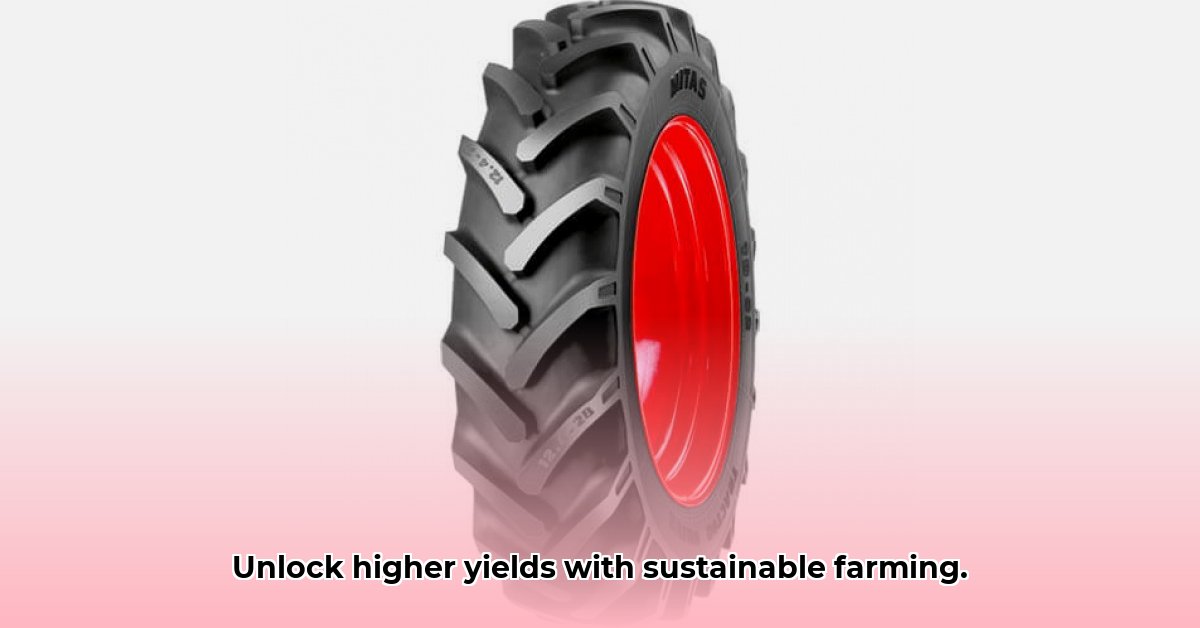
The 11.2x28 tractor tire represents a significant advancement in sustainable agriculture, offering farmers a path to increased efficiency and environmental responsibility. This comprehensive guide explores the technical specifications, environmental benefits, and practical applications of this tire size, demonstrating its potential to revolutionize modern farming practices. For optimal tire maintenance, check out these helpful resources.
Understanding the 11.2x28's Role in Sustainable Agriculture
The 11.2x28 tire size is frequently chosen for medium-sized tractors engaged in diverse farming operations. Its superior design contributes significantly to sustainable practices by minimizing soil compaction, optimizing fuel efficiency, and extending tire lifespan. But how does it achieve these critical goals? Let's delve into the specifics.
Technical Specifications and Sustainable Design Features
The 11.2x28's effectiveness stems from its carefully engineered design features. These aren't merely specifications; they translate directly into tangible environmental and economic advantages for farmers.
| Feature | Description | Sustainability Impact |
|---|---|---|
| Tread Pattern | Deep, wide, strategically spaced lugs (the raised tread blocks) | Minimizes soil compaction, improves water infiltration, promotes healthy root growth, and enhances soil health. |
| Construction | Heavy-duty materials and reinforced casing | Extended tire life reduces waste from frequent replacements and lowers long-term costs. |
| Load Capacity | High load capacity allows for fewer passes across the field | Fewer passes translate to reduced fuel consumption, lowered greenhouse gas emissions, and improved efficiency. |
| Rolling Resistance | Optimized for smooth rolling with reduced resistance | Improved fuel efficiency leads to cost savings and a diminished carbon footprint. |
Aren't these features compelling enough to consider the long-term impact on your farming operations?
Quantifiable Environmental and Economic Benefits
The 11.2x28 tire offers a substantial return on investment through several key mechanisms. How significant are these improvements? Let's take a closer look.
Reduced Soil Compaction: Studies suggest that the 11.2x28 can reduce soil compaction by up to 15% compared to standard tractor tires. This leads to improved water drainage, better aeration, healthier soil structure, and enhanced crop yields. Reduced compaction also minimizes the need for chemical fertilizers, promoting a more environmentally friendly approach.
Improved Fuel Efficiency: Farmers can expect to save approximately 10% on fuel per acre. This translates to substantial cost savings over the tire's lifespan, alongside a considerable reduction in greenhouse gas emissions. Isn't this a powerful incentive for adopting a more sustainable practice?
Extended Tire Lifespan: The durable construction significantly extends the tire's lifespan. This reduced need for replacements minimizes waste sent to landfills and lowers the overall cost of ownership. This sustainable aspect underscores the tire’s long-term value proposition.
Practical Application and Maintenance for Optimal Performance
Maximizing the benefits of your 11.2x28 requires understanding and implementing these practical steps:
1. Tire Pressure Management: Maintaining optimal tire pressure is paramount. Underinflation increases fuel consumption and wear, while overinflation can compact the soil. Consult your tire's sidewall and your tractor's manual for recommended pressures, adjusting based on soil conditions and workload.
2. Regular Maintenance: Regular visual inspections for wear, cuts, or embedded objects are crucial. Promptly address any issues to prevent major damage and costly repairs.
3. Cost-Benefit Analysis: While the 11.2x28 has a higher initial cost, the long-term fuel savings, reduced maintenance, and potential yield increases quickly offset the initial investment. This makes it a financially and environmentally sound choice in the long run.
Conclusion: Investing in a Sustainable Future
The 11.2x28 tractor tire goes beyond merely being a replacement part; it's an investment in the sustainability and profitability of your farm. By minimizing soil compaction, maximizing fuel efficiency, and extending tire lifespan, this tire presents a compelling solution for environmentally conscious farmers seeking both ecological and economic advantages. The long-term benefits far outweigh the initial cost, offering a sustainable pathway to a more successful and responsible farming operation.